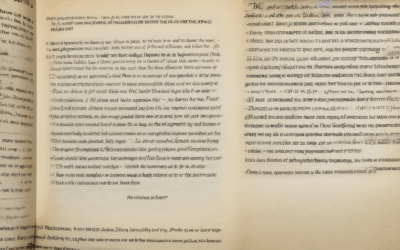Exploring one’s identity is a profound journey of self-discovery and introspection, often best expressed through the medium of personal essays. Whether delving into the complexities of cultural heritage, psychological makeup, or life experiences, personal essays on identity offer a unique lens through which individuals can articulate their existence. For those embarking on this creative endeavor, crafting a compelling personal essay on identity requires careful thought, emotional depth, and a structured approach. This guide will walk you through the essential steps to craft a meaningful personal essay on identity, ensuring your voice resonates authentically and your insights provoke deeper reflection. By mastering the art of storytelling and leveraging the power of descriptive language, you can transform your identity exploration into a captivating narrative that captures the essence of who you are.
Key Takeaways
- Begin with deep introspection to uncover your true self and personal history.
- Use vivid stories and anecdotes to make your essay relatable and engaging.
- Explore how cultural and societal influences shape your identity and beliefs.
- Organize your essay with a clear structure to guide readers smoothly through your narrative.
- Be open about your emotions to add depth and authenticity to your writing.
- Conclude with a reflective thought to invite readers to ponder their own identity journeys.
- Craft your essay with authenticity to resonate genuinely with readers.
- Follow a clear narrative structure to ensure your story flows naturally.
- Connect emotionally to create a lasting impact on your audience.
- Revise and refine your work to polish it into a compelling piece.
- Develop a distinct voice to make your essay uniquely yours.

How to Write a Personal Essay on Identity
Writing a personal essay on identity is a deeply introspective process that invites readers to explore the complexities of self-discovery. To craft an engaging and impactful essay, consider the following structured approach:
Understanding the Core Elements
Identity is a multifaceted concept that encompasses personality, background, and life experiences. Begin by defining your understanding of identity and how it has evolved over time. Consider questions like:
- What defines me?
- How have my experiences shaped who I am?
- What influences have contributed to my beliefs and values?
Exploring Personal History
Delve into your personal history to uncover significant moments that have impacted your identity. Reflect on:
- Your upbringing and formative years.
- Key relationships that have shaped your perspective.
- Major life events or milestones.
Consider how these experiences have influenced your sense of self and contributed to your unique traits.
Examining Relationships
Relationships play a crucial role in shaping identity. Explore how connections with family, friends, and communities have influenced your views and behaviors. Reflect on:
- Family dynamics and their impact on your identity formation.
- Friendships and the roles they play in your life.
- The influence of your local community or cultural background.
Cultural and Societal Influences
Consider the broader cultural and societal contexts that have shaped your identity. Think about:
- National identity and its impact on your sense of belonging.
- Racial or ethnic influences on your worldview.
- Gender roles and their effect on your personal development.
Articulating Your Unique Voice
Find your unique voice by experimenting with different writing styles and perspectives. Ask yourself:
- How can I express my thoughts and feelings most authentically?
- What narrative style suits my story best?
- How can I make my experiences relatable to others?
Engaging with the Reader
Make your essay engaging by inviting readers to reflect on their own identities. Use prompts or questions to encourage interaction and deeper thinking. Examples include:
- “How has your upbringing shaped your identity?”
- “What role have your relationships played in your life?”
- “How do you see yourself in relation to your culture or society?”
Conclusion
Conclude your essay by summarizing your journey of self-discovery and the lessons you’ve learned along the way. Emphasize the dynamic and evolving nature of identity, leaving readers with a sense of inspiration to explore their own paths.
By following these steps, you can create a personal essay on identity that is both reflective and resonant, inviting readers to embark on their own journey of self-discovery.
For more insights and resources on personal storytelling, visit PeterSpirito . Explore articles on life’s journey, creative reflections, and tips for meaningful writing.
What Are the Key Elements Needed for a Compelling Personal Essay on Identity?
A compelling personal essay on identity is built on several essential components that combine personal reflection, storytelling, and structural clarity. Here are the key elements:
- Personal Reflection and Introspection : Begin by examining your own beliefs, experiences, and feelings about identity. Reflect on how personal history, culture, and environment have shaped your sense of self.
- Storytelling and Anecdotes : Use vivid, relatable stories from your life to illustrate your thoughts. Stories make the essay engaging and allow readers to connect with your journey.
- Cultural and Societal Influences : Explore how cultural norms, historical events, or societal expectations have impacted your identity. This adds depth and context to your narrative.
- Clarity and Structure : Organize your essay with a clear theme or thesis. Use logical paragraphs to guide readers through your exploration of identity, ensuring your ideas flow naturally.
- Emotional Vulnerability : Be honest and open about your emotions. Sharing vulnerability makes your essay more relatable and authentic.
- Conclusion and Contemplation : End with a thought-provoking reflection or question that invites readers to consider their own identity journeys.
For further reading on crafting impactful personal essays, explore our Identity Inspiration collection and learn more about Effective Writing Techniques .

What Are the Key Elements Needed for a Compelling Personal Essay on Identity?
A compelling personal essay on identity is built on several essential components that combine personal reflection, storytelling, and structural clarity. Here are the key elements:
- Personal Reflection and Introspection : Begin by examining your own beliefs, experiences, and feelings about identity. Reflect on how personal history, culture, and environment have shaped your sense of self.
- Storytelling and Anecdotes : Use vivid, relatable stories from your life to illustrate your thoughts. Stories make the essay engaging and allow readers to connect with your journey.
- Cultural and Societal Influences : Explore how cultural norms, historical events, or societal expectations have impacted your identity. This adds depth and context to your narrative.
- Clarity and Structure : Organize your essay with a clear theme or thesis. Use logical paragraphs to guide readers through your exploration of identity, ensuring your ideas flow naturally.
- Emotional Vulnerability : Be honest and open about your emotions. Sharing vulnerability makes your essay more relatable and authentic.
- Conclusion and Contemplation : End with a thought-provoking reflection or question that invites readers to consider their own identity journeys.
For further reading on crafting impactful personal essays, explore our Identity Inspiration collection and learn more about Effective Writing Techniques .

What Are the Key Elements Needed for a Compelling Personal Essay on Identity?
A compelling personal essay on identity is built on several essential components that combine personal reflection, storytelling, and structural clarity. Here are the key elements:
- Personal Reflection and Introspection : Begin by examining your own beliefs, experiences, and feelings about identity. Reflect on how personal history, culture, and environment have shaped your sense of self.
- Storytelling and Anecdotes : Use vivid, relatable stories from your life to illustrate your thoughts. Stories make the essay engaging and allow readers to connect with your journey.
- Cultural and Societal Influences : Explore how cultural norms, historical events, or societal expectations have impacted your identity. This adds depth and context to your narrative.
- Clarity and Structure : Organize your essay with a clear theme or thesis. Use logical paragraphs to guide readers through your exploration of identity, ensuring your ideas flow naturally.
- Emotional Vulnerability : Be honest and open about your emotions. Sharing vulnerability makes your essay more relatable and authentic.
- Conclusion and Contemplation : End with a thought-provoking reflection or question that invites readers to consider their own identity journeys.
For further reading on crafting impactful personal essays, explore our Identity Inspiration collection and learn more about Effective Writing Techniques .
The Key Components of a Successful Personal Essay on Identity
A successful personal essay on identity is built on several essential elements that combine to create a compelling and impactful narrative. Here’s a breakdown of what makes such an essay stand out:
1. Introspection and Authenticity
The foundation of any personal essay on identity lies in introspection. To craft an authentic piece, writers must delve deeply into their own thoughts, feelings, and experiences. Authenticity ensures that the essay resonates genuinely with readers, fostering connection and empathy.
Reflect on moments in your life that have shaped your sense of self. Whether it’s a childhood memory, a pivotal decision, or a recent challenge, these experiences should serve as the backbone of your essay.
2. A Clear Narrative Structure
A well-organized essay is more likely to engage readers. Consider the following framework:
- Introduction: Begin with a hook that captures attention, such as a vivid anecdote or a thought-provoking statement. Introduce the central theme of your essay—your understanding of identity.
- Body Paragraphs: Divide your essay into sections that explore different facets of identity. Discuss how certain events, relationships, or beliefs have contributed to your sense of self.
- Conclusion: Conclude by reflecting on your journey of self-discovery. Highlight lessons learned and how your perspective on identity has evolved.
3. Emotional Resonance
A personal essay on identity should evoke emotions. Strive to write in a way that invites readers to feel your passion, pain, or joy. Share stories that highlight your uniqueness and the challenges you’ve faced.
Emotional resonance creates a deeper connection with readers, making your essay memorable long after they finish reading.
4. Revising and Refining
Writing is just the beginning. revisions are crucial for polishing your essay. Edit to enhance clarity, remove redundancies, and tighten your prose. Consider feedback from others to gain fresh perspectives.
A polished essay free of grammatical errors and stylistic inconsistencies will leave a stronger impression.
5. A Unique Voice
Your essay should reflect your individual style. Develop a distinct voice that aligns with your personality and the themes you’re exploring. Whether humorous, introspective, or lyrical, consistency in your writing enhances the overall impact.
A unique voice sets your work apart and helps readers identify with your perspective.
By combining introspection, a clear structure, emotional depth, and a refined style, you can create a personal essay on identity that is both meaningful and memorable.

What Are the Essential Components Needed for a Successful Personal Essay on Identity?
An effective personal essay on identity requires a combination of introspection, storytelling, and thematic depth. Here are the key components that contribute to a successful exploration of identity:
- Personal History and Background : Begin by detailing your upbringing, family influence, and significant life events. Reflect on how these experiences have shaped your beliefs, values, and sense of self.
- Introspection and Self-Reflection : Use journaling or meditation to delve deeply into your emotions, thoughts, and feelings. Consider questions like “Who am I?” and “What makes me unique?”
- Engaging Stories and Anecdotes : Share vivid, personal stories that illustrate your journey. These anecdotes should highlight pivotal moments in your life that contributed to your identity formation.
- Cultural and Societal Influences : Explore how cultural norms, societal expectations, and historical contexts have impacted your identity. Consider the role of race, gender, class, and other factors.
- Vulnerability and Emotional Depth : Authenticity is crucial. Write about your struggles, fears, and challenges. Sharing these openly can resonate with readers and deepen the essay’s impact.
- Thematic Consistency : Identify central themes such as resilience, transformation, or belonging. Ensure these themes weave throughout your essay, providing coherence and purpose.
- Audience Connection : Tailor your essay to appeal to the intended audience. Consider their interests, backgrounds, and potential reactions to your story.
- Conclusion and Final Thoughts : Wrap up your essay by summarizing your journey and reflecting on what you’ve learned. Conclude with a meaningful quote or statement that ties back to your theme.
By incorporating these elements, you can craft a personal essay on identity that is both deeply personal and universally relatable. For further inspiration and tips, explore Peter Spirito and other platforms dedicated to personal storytelling.
Final Thoughts
A successful personal essay on identity is a blend of authenticity, depth, and thematic resonance. By focusing on your unique journey and connecting with universal themes, you can create a compelling narrative that captivates readers and invites reflection.




0 Comments